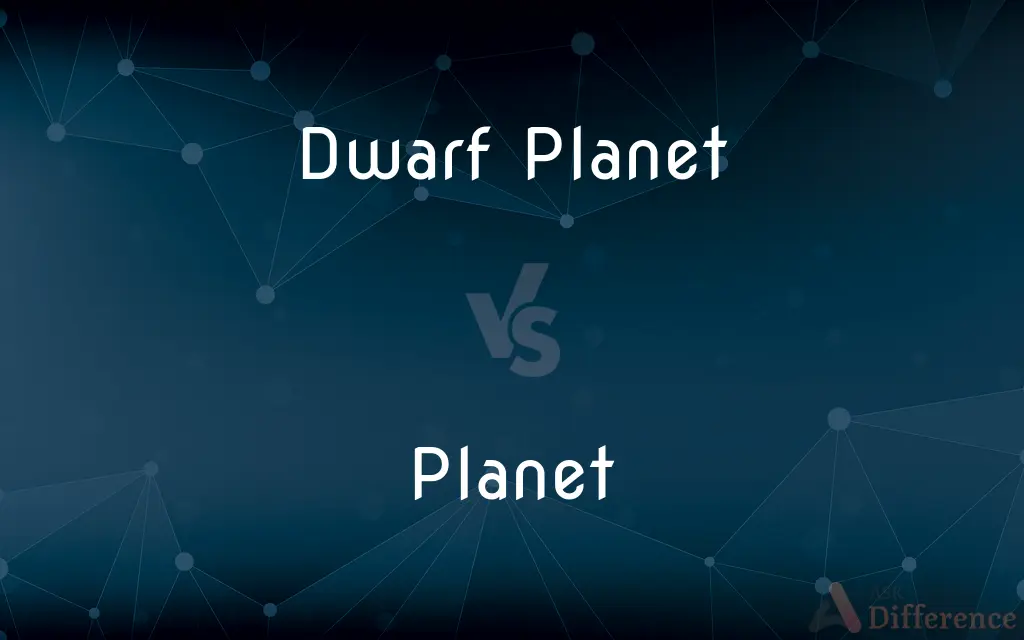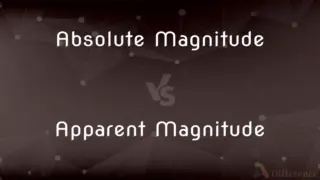Dwarf Planet vs. Planet — What's the Difference?
By Tayyaba Rehman — Published on November 10, 2023
Dwarf Planets are smaller celestial bodies that orbit a star but don't clear their orbits, while Planets are larger celestial bodies that do clear their orbits around a star.

Difference Between Dwarf Planet and Planet
Table of Contents
ADVERTISEMENT
Key Differences
Dwarf Planets and Planets are celestial bodies, but their classification is governed by specific criteria set by the International Astronomical Union (IAU). A Planet is a celestial body that orbits the Sun, is spherical due to its gravity, and has cleared its orbit of other debris. Conversely, while a Dwarf Planet shares the first two characteristics with a Planet, it doesn't clear its orbit.
Both Dwarf Planet and Planet, by definition, must orbit the Sun, distinguishing them from other celestial objects like stars or moons. A Planet, due to its larger size and gravitational influence, will have removed most other objects in its orbital path. A Dwarf Planet, however, lacks the gravitational dominance to clear its path, resulting in shared orbits with other bodies.
Understanding the distinctions between Dwarf Planet and Planet is crucial for astronomy and the study of our solar system. While the term Planet has been around for centuries, the term Dwarf Planet was officially recognized in 2006, leading to reclassifications, notably with Pluto.
Both categories, Dwarf Planet and Planet, enhance our understanding of the universe's makeup. While there are only eight recognized Planets in our solar system, there are numerous Dwarf Planets, and many more are likely undiscovered. Recognizing these categories helps astronomers and scientists in their study of celestial mechanics and the solar system's evolution.
Comparison Chart
Definition
Celestial body resembling a small planet.
Large celestial body orbiting a star.
ADVERTISEMENT
Orbiting
Orbits the Sun.
Orbits the Sun.
Clears its Orbit
Does not clear its orbit of other debris.
Clears its orbit of other objects.
Spherical Shape
Achieves a nearly round shape due to its gravity.
Achieves a nearly round shape due to its gravity.
Number in our Solar System
Multiple (e.g., Pluto, Haumea).
Eight (e.g., Earth, Jupiter).
Compare with Definitions
Dwarf Planet
Lacks gravitational dominance like planets.
Eris is a Dwarf Planet as it hasn't cleared its orbital path.
Planet
A large celestial body orbiting a star.
Earth is the third Planet from the Sun.
Dwarf Planet
Does not clear its orbit of other debris.
Unlike Jupiter, a Dwarf Planet shares its orbit with other bodies.
Planet
Dominant in its orbital region.
Jupiter is a Planet due to its size and clear orbit.
Dwarf Planet
A category recognized officially in 2006.
The term Dwarf Planet was established by the IAU in 2006.
Planet
A nearly round shape due to gravitational forces.
The shape of Venus, a Planet, is spherical because of its gravity.
Dwarf Planet
A celestial body orbiting the Sun.
Pluto was reclassified as a Dwarf Planet.
Planet
One of eight in our solar system.
Mercury is the smallest Planet in our solar system.
Dwarf Planet
Nearly spherical due to its gravity.
Haumea is considered a Dwarf Planet because of its shape and orbit.
Planet
Must clear its orbit of other objects.
Mars, being a Planet, has a clear orbit around the Sun.
Planet
In the traditional model of solar systems, a celestial body larger than an asteroid or comet, illuminated by light from a star, such as the sun, around which it revolves.
Planet
A celestial body that orbits the sun, has sufficient mass to assume nearly a round shape, clears out dust and debris from the neighborhood around its orbit, and is not a satellite of another planet.
Planet
One of the seven celestial bodies, Mercury, Venus, the moon, the sun, Mars, Jupiter, and Saturn, visible to the naked eye and thought by ancient astronomers to revolve in the heavens about a fixed Earth and among fixed stars.
Planet
The collection of life forms supported on Earth
An asteroid that threatened the whole planet.
Planet
People as a whole; humankind or the general public
The entire planet was affected by the global recession.
Planet
One of the seven revolving astrological celestial bodies that in conjunction with the stars are believed to influence human affairs and personalities.
Planet
Each of the seven major bodies which move relative to the fixed stars in the night sky—the Moon, Mercury, Venus, the Sun, Mars, Jupiter and Saturn.
Planet
(astronomy) A body which is massive enough to be in hydrostatic equilibrium (generally resulting in being an ellipsoid) but not enough to attain nuclear fusion and, in IAU usage, which directly orbits a star (or star cluster) and dominates the region of its orbit; specifically, in the case of the Solar system, the eight major bodies of Mercury, Venus, Earth, Mars, Jupiter, Saturn, Uranus, and Neptune.
Planet
Construed with|en|the or}} this}}: {{synonym of Earth.
Planet
A celestial body which revolves about the sun in an orbit of a moderate degree of eccentricity. It is distinguished from a comet by the absence of a coma, and by having a less eccentric orbit. See Solar system.
Planet
A star, as influencing the fate of a men.
There's some ill planet reigns.
Planet
Any of the celestial bodies (other than comets or satellites) that revolve around the sun in the solar system
Planet
A person who follows or serves another
Common Curiosities
Why was Pluto reclassified as a Dwarf Planet?
Pluto was reclassified because it doesn't clear its orbit of other objects.
How do Planets and Dwarf Planets differ in terms of orbit?
Planets clear their orbits of debris, while Dwarf Planets do not.
How many Planets are in our solar system?
There are eight recognized Planets in our solar system.
Do both Dwarf Planets and Planets orbit the Sun?
Yes, both Dwarf Planets and Planets orbit the Sun.
What defines a Dwarf Planet?
A Dwarf Planet orbits the Sun, is nearly round, but doesn't clear its orbit of other debris.
Are Dwarf Planets found outside our solar system?
Currently, Dwarf Planets are recognized within our solar system, but similar objects may exist elsewhere.
Can a Dwarf Planet become a Planet?
Not typically, as it would require significant changes in its orbit and gravitational influence.
Is the Earth a Planet or a Dwarf Planet?
Earth is a Planet because it clears its orbit and meets the other criteria.
Which was the first Dwarf Planet to be recognized?
Pluto was the first to be reclassified as a Dwarf Planet.
Which is larger, a Dwarf Planet or a Planet?
A Planet is generally larger and has more gravitational dominance than a Dwarf Planet.
How did the term Dwarf Planet come about?
The term Dwarf Planet was established by the IAU in 2006 to categorize bodies like Pluto.
What makes a celestial body a Planet?
A body that orbits the Sun, is nearly round, and clears its orbit of debris is a Planet.
Are there undiscovered Dwarf Planets in our solar system?
Yes, many Dwarf Planets likely remain undiscovered in our solar system.
Do Dwarf Planets have moons?
Yes, some Dwarf Planets, like Pluto, have moons.
How are the terms Dwarf Planet and Planet used in astronomy?
They are used to classify celestial bodies based on specific criteria set by the IAU.
Share Your Discovery

Previous Comparison
Chlorate vs. Perchlorate
Next Comparison
Absolute Magnitude vs. Apparent MagnitudeAuthor Spotlight
Written by
Tayyaba RehmanTayyaba Rehman is a distinguished writer, currently serving as a primary contributor to askdifference.com. As a researcher in semantics and etymology, Tayyaba's passion for the complexity of languages and their distinctions has found a perfect home on the platform. Tayyaba delves into the intricacies of language, distinguishing between commonly confused words and phrases, thereby providing clarity for readers worldwide.












































